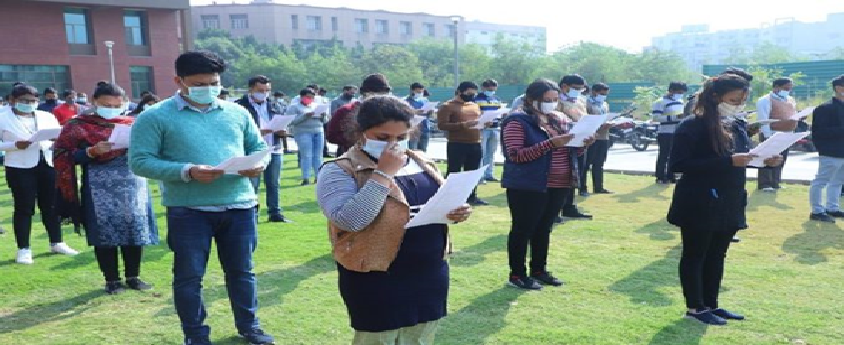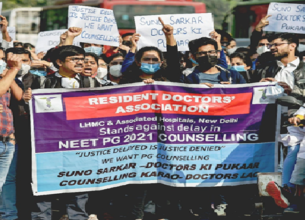Governor returns NEET Bill to Assembly
04, Feb 2022

Prelims level : Governance - Policies
Mains level : GS-II Functions and responsibilities of the Union and the States, issues and challenges Pertaining to the Federal Structure, Devolution of Powers and Finances up to local levels and Challenges therein.
Why in News?
- Tamil Nadu Governor R.N. Ravi has returned to the Assembly Speaker a Bill seeking to dispense with NEET-based admissions for undergraduate medical degree courses.
About the News:
- The Bill adopted by the Assembly in September sought to admit students to UG medical degree programmes on the basis of Plus Two scores.
- After a detailed study of the Bill that sought an exemption for the State from NEET and the report of the high-level committee constituted by the State government in this regard, the Governor was of the opinion that the Bill is against interests of the students specially the rural and Economically poor students of the State.
- Hence, the Governor has returned the Bill to the Speaker of the Tamil Nadu Legislative Assembly, giving detailed reasons, for its re-consideration by the House.
Veto Over State Bills:
- The governor is empowered to reserve certain types of bills passed by the state legislature for the consideration of the President. Then, the Governor will not have any further role in the enactment of the bill.
- The President can withhold his assent to such bills not only in the first instance but also in the second instance.
- Thus, the President Enjoys absolute veto (and not suspensive veto) over state bills.
- Further, the President can Exercise Pocket veto in respect of state Legislation also.
What was TN Government’s Argument?
- The Bill, moved by Chief Minister M.K. Stalin, contended that admission to medical courses was traceable to entry 25 of List III, Schedule VII of the Constitution, and the State was “competent to regulate” the same for the underprivileged social groups.
- NEET festers inequality as it favours the rich and the more privileged class of society, who are able to afford special coaching apart from pursuing Class XII. It virtually barricades the underprivileged social groups from medical and dental education.
- It also argued that NEET was against the equality clause enshrined in the Constitution.
- After the UG course, students from the affluent class do not serve in rural areas, and often pursue postgraduate courses abroad, adding that the number of serving doctors in the State was declining.
- The standard of medical education is maintained during the UG course by following the syllabus and curriculum prescribed by the National Medical Commission and through exams conducted by the university before awarding the degree.
- Students who are not able to pass the university exams are not awarded degrees. Therefore, it is not during the admission stage that the standard of medical education is maintained.
- The Bill said its aim was to ensure social justice, uphold equality and equal opportunity, protect all vulnerable student communities from discrimination and bring them into the mainstream of medical and dental education and, in turn, ensure robust public healthcare across Tamil Nadu, particularly in the rural areas.
What did A.K. Rajan Committee Reported?
- The government’s decision followed a report from a high-level committee, headed by the retired High Court judge, Justice A.K. Rajan, which said NEET had “clearly undermined” the diverse societal representation in MBBS and higher medical studies, favouring mainly the affluent segment of society, while thwarting the dream of the underprivileged social groups to pursue medical education.
- The panel concluded that if NEET continued for a few more years, the healthcare system of Tamil Nadu would be “very badly affected, and there may not be enough doctors” to be posted at Primary Health Centres or Government hospitals, and the rural and urban poor may not be able to join the Medical Courses.
- It was in favour of immediate steps to eliminate NEET from being used in admission to medical programmes “at all levels”.
- It further contended that NEET was not a fair or equitable method of admission, since it ‘favoured’ the rich and elite sections of society. The most affected groups were the students of Tamil medium; students having a rural background; those from government schools; those whose parental income was less than ₹5 lakh per annum; and socially disadvantaged groups like the Most Backward Classes (MBCs), the Scheduled Castes (SCs) and the Scheduled Tribes (STs).
- Based on the report, the State government decided that admission to undergraduate courses in medicine, dentistry, Indian medicine and homoeopathy in the State shall be made only based on the marks obtained in the qualifying examination (Plus-Two).
Can a state Negate Central Laws?
- Article 254(2) refers to a scenario where a law made by a state legislature concerning any matter that falls in the Concurrent List contains any provision repugnant to the provisions of an earlier law made by Parliament or an existing law, with respect to that matter.
- In such a case, the law made by the state legislature will prevail, provided it is reserved for the consideration of the President of India and Receives his assent.
How can States use this Provision?
- This provision gives flexibility to a state legislature to make a law different from what is applicable in that state due to a Parliamentary law already in operation there.
- This flexibility is only available on matters that are in the concurrent list to Schedule 7 of the Constitution. Under that list both the Parliament and the state legislatures could legislate — subject to the rule that the parliamentary law will prevail over a state law.
What all is covered under concurrent list?
- The concurrent list provides a rich set of topics for the states to take a lead in reform. It covers areas such as criminal law and procedure, marriage, divorce and adoption, bankruptcy and insolvency, social security, education (including technical and medical education) and electricity.
- Agriculture’ has been placed as Entry 14 in the State List along with several ancillary matters, while some agriculture-related items have been included in the Union List and the Concurrent List.
Will this Provision help the States?
- Though states could come out with their own Bills to some extent to override the statutes of passed by the Parliament, none of those Bills would be effective unless the President accords his consent to such Bills.
What Happens if President does not give consent?
- According to legal experts, it’s the sole prerogative of the President whether to sign the state Bills or not. It’s a rare circumstance, wherein a state Bill is accepted by the President without the Centre on board.
- In case, the Centre is opposing the Bill, then the President, who works on the aid and advice of the Council of Ministers, can refuse to give his consent.
Can states approach the Supreme Court Challenging the Central Law?
- States can approach the Supreme Court under Article 131 — invoking the court’s “original jurisdiction” — that allows a state to file a suit in the Supreme Court in case of any dispute that it may have with the central government.
- Article 131 could be used to Examine the Constitutionality of a statute.







